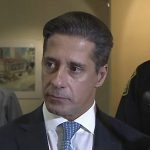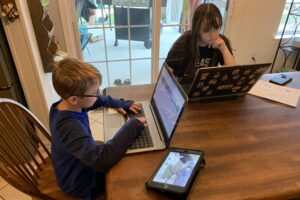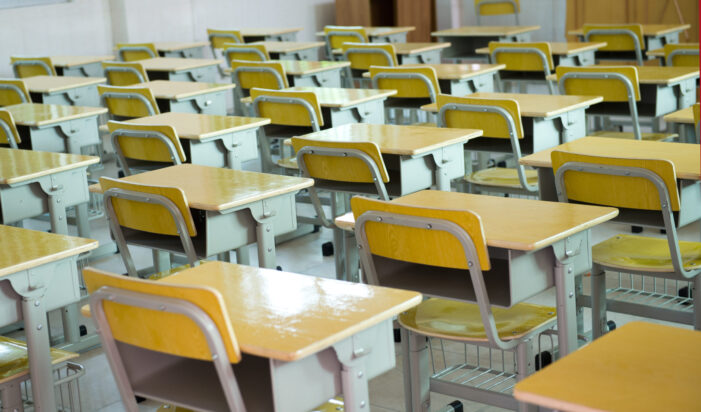To be or not to be — at school?
That is the question many parents are grappling with in the coming weeks as they decide how they want their children to resume their K-12 education in the time of COVID19 this fall.
President Donald Trump and Education Secretary Betsy Devos have said to get the kids physically  back in brick and mortar schools already, against Center for Disease Control recommendations. Full time. Como si nada.
back in brick and mortar schools already, against Center for Disease Control recommendations. Full time. Como si nada.
In Florida, which just made a national record as the first state to have 15,299 positive cases, according to the state department of health, Gov. Ron DeSastre DeSantis is preaching the same thing.
In Miami-Dade, where three kids and 15 staffers at summer camps have tested positive, Mayor Carlos Gimenez has pushed back, saying it will be a local decision and there’s no way to know if we’ll be ready in six weeks for our 357,000 students to go back to school.
Should it be solely online, like it was for the last few, chaotic months of the 2019-2020 school year?
Should it mean going physically back to campus (read: Petri dish) to sit in an closed space for seven hours a day or more, five days a week?
Or should it be a hybrid, with some days at school and some days online from home?
Read related: To wear or not to wear a mask question depends on where, causes confusion
These are the choices that the Miami-Dade Schools Superintendent  Albert Carvalho gave parents in an online survey, trying to make this look like its about parent choice. Pfffft. If you’re not being honest and telling parents what they might expect, u’re not really giving them choices.
Albert Carvalho gave parents in an online survey, trying to make this look like its about parent choice. Pfffft. If you’re not being honest and telling parents what they might expect, u’re not really giving them choices.
Carvalho said last week that he won’t open Miami-Dade public schools Aug. 24 if the county has not entered Phase II of the reopening, which is explained on the school system’s website. It’s still in Phase I, and sliding backward. His announcement was praised by the United Teachers of Dade, which represents more than 20,000 educators.
But a couple of teachers have told Ladra that Carvalho and the board have made their minds up already, survey be damned. They’ve had meetings. They’ve bought supplies. Their school principals are telling them to be prepared to come in to work next month. After all, Republican leaders have threatened to withdraw education funding if schools don’t open.
So is this survey an exercise in public relations? Or a risk management project?
Interestingly enough, nobody bothered to ask teachers, who overwhelmingly are against it.
“It’s really ludicrous for the White House and Florida Gov. Ron DeSantis to say that all schools must reopen when Miami is the epicenter of Florida for the virus,” UTD President Karla Hernandez-Mats said to CNN in a now repeated famous quote. “This is about science, not science fiction…we have leaders that are only basing their reality on something that apparently is science fiction.”
Read related: COVID-19 rollback reveals Mayor Carlos Gimenez is flying blind here
“I’m ready for it. I have gear,” said one 30-some year veteran. “But the children are being used. They will not like being in tension all day  long.
long.
“The kids’ will take each others’ masks. They will play with them, lose them, hide them. Watch how the parents who can’t wait to drop off their kid will say their child cannot breathe with a mask. Other parents will start complaining about kids not wearing masks.
“I have a lot to teach these kids about this moment in history so I can’t wait to go back,” she added, sarcastically, because she would rather continue teaching remotely until its safer. “Then we will close because the virus gives not a thing about what bad leadership wants. It will spread. Like crazy.”
Las malas lenguas say that parents are choosing along predictable lines. Those who can work from home, who have access to healthcare and insurance — some of Ladra’s generation, whose own parents took them to “chicken pox parties” so they’d get immunity in childhood — are choosing the hybrid model because having the kids at home more has been “a blessing” and they want the best of both worlds.
The parents who have to leave the house to work and live paycheck to paycheck with few childcare options and inadequate healthcare want their children at school — but safely. Yet they’re terrified.
Why are we going through all of this unnecessary turmoil? It’s going to be impossible for every K-12 student in the fourth largest school district in the country to go back to class this fall no matter how much hand sanitizer they hand out in home room. And the moment anyone tests positive for COVID19 — teacher or student or office staff — the whole school is going to close and everyone has to go home and quarantine for at least 14 days anyway.
So don’t get comfortable!
Read related: 25 mayors slap Carlos Gimenez on solo rollback, demand more contact tracing
Why don’t we start by being honest with parents? Stop feigning that this is for the benefit of their children, because a lack of socialization skills will stymie their emotional and intellectual development. Corona kids won’t be working on their socialization skills. They will be working on their antisocial skills as social distancing will still be the style. What does that look like at a school? In a classroom?

No group projects. No lab partners. No sharing of nada. Students will sit in the same chair pretty much all day, probably wearing a face mask for most of that time. They might be forced to have lunch at their desks. Art class will be Zoomed in. There will be no instruments or singing in music class. There will be no group sports in phys ed, only exercise. There will be no clubs or teams.
In other words, all opportunities for socialization have been obliterated.
“These kids will hate what is waiting for them,” said the veteran teacher. “Poor kids. They think they will be playing and together. They will be prisoners to their desks. That is the plan.”
This is really about a babysitting service. We’re all adults here. We know that there are people who can’t go back to work if their younger children don’t have a place to be all day. We get that. So, instead of making parents decide what’s most convenient for them individually, let’s solve everyone’s problem. Nobody asked parents to vote before the schools closed. Why is the reopening being treated differently? Are parents suddenly better equipped to make the decision?
The best way to handle the reopening of schools is slowly and in increments. It not be popular, but we  can’t leave it up to parents. They are part of a community and this is just how it has got to be: Those who can work from home have to continue working from home at least through December. Yeah, it’s a bit of a bitch, but we’re #allinthistogether. Right? That way, we can provide the reduced number of seats — classes should be waaaay smaller — only to the students who can’t learn at home, either because they can’t be left alone while their parents work or they don’t have WiFi, which happens more often than it should.
can’t leave it up to parents. They are part of a community and this is just how it has got to be: Those who can work from home have to continue working from home at least through December. Yeah, it’s a bit of a bitch, but we’re #allinthistogether. Right? That way, we can provide the reduced number of seats — classes should be waaaay smaller — only to the students who can’t learn at home, either because they can’t be left alone while their parents work or they don’t have WiFi, which happens more often than it should.
Teachers who are chosen to work in real life in the schools, who run a higher risk of being exposed to the virus, should be the healthier, younger teachers and/or anyone who wants to get hazard pay or something extra for their trouble.
Read related: COVID19 spike in Miami-Dade makes Mayor Carlos Gimenez warn businesses
But it’s too controversial to tell the truth, to say, “I’m sorry if the beautiful people are going to be upset, but they are going to have to stay home until December and kids come to school only if they have to. Too bad. So sad.”
Because it’s about the numbers.
Former Miami-Dade School Board Member Raquel Regalado, who is running for a county  commission seat, said it’s a difficult decision to make but that elected officials should make the choice so parents don’t have to.
commission seat, said it’s a difficult decision to make but that elected officials should make the choice so parents don’t have to.
“All Florida parents have the legal right to virtual school,” Regalado said. “We all want our children to return to school if they are safe. Some of us are blessed to be able to work from home and parents and teachers should not be asked to choose between their health and their job.”
She is worried about the social economic effect of these educational changes, some of which may become permanent.
“Parental choice is important, but we need to be honest as a community when we make our personal choices and recognize that this choice largely impacts two groups more than others — one, low income workers and, two, working women,” Regalado said. “By not discussing the disparities, we are marginalizing these groups instead of supporting them in their ‘choice.'”
It may still more of a babysitting service than anything, but kids could learn something, maybe, hopefully. And, hey, some people need a babysitting service.
It’s okay to say it out loud.

